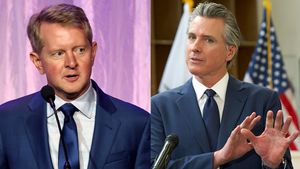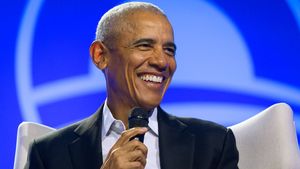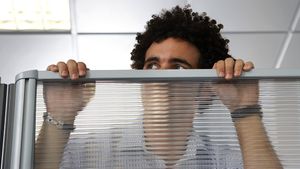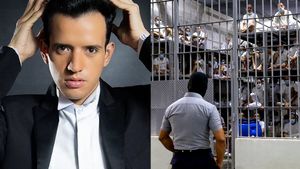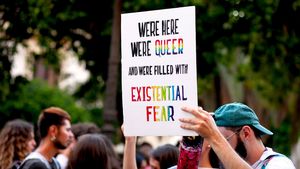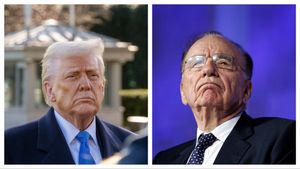Colman Domingo returns to the screen in The Madness, a gripping Netflix series that takes audiences on a psychological thrill ride, blurring the lines between reality and perception.
Set against the backdrop of a society increasingly unsure of what to trust, the series questions not only what is real but also where we, as individuals, fit within a fractured world. Domingo's character navigates a labyrinth of truths, lies, and dangerous revelations, forcing viewers to confront their own beliefs about identity, morality, and the systems we rely on. In an era where misinformation is rampant,
The Madness holds a mirror up to the complexities of modern life, challenging audiences to reevaluate their place in a chaotic world.
Known for his powerful and thought-provoking performances, Domingo has a history of tackling roles that don’t shy away from addressing the gritty realities of life. Whether it’s exploring systemic injustice, personal identity, or societal flaws, Domingo
masterfully brings these issues to the forefront, making them impossible to ignore. The Madness continues this legacy, pushing boundaries and delivering a narrative that is as unsettling as it is poignant. With his undeniable charisma and a knack for embodying deeply layered characters, Domingo not only drives the story forward but also ensures it lingers in the minds of viewers long after the credits roll. This series is more than entertainment; it's a wake-up call for those willing to listen.
In an interview with
Out, Domingo opens up about how the show reflects society’s hidden truths, the themes of redlining and racial inequity it tackles, and whether art like this can truly change perspectives or simply spark surface-level conversations.
 Colman Domingo in 'The Madness.'Netflix
Colman Domingo in 'The Madness.'Netflix
Out: The Madness unearths a world where the hidden, unseen truths collide with personal and collective identity. How do you see the narrative of the show reflecting the current state of the world, especially when it comes to the secrets societies and individuals choose to hide?
Come on, Ty! Listen, the show is about the madness that we're living in right now. All these seeds of disinformation that are planted. All that you're digesting in social media and you having no way out and figuring out what is the truth, what is real. This helps you raise questions — what's behind door number 2, 3, 4, 5, 6, 7 and 8, 9 and 10? And to not just take what's served, but actually go a little deeper.
Here's someone who's sitting in the middle of sort of the entertainment and the circus — a CNN pundit who is also a college professor has a platform, yet he's a part of the media circus, whether he realizes it or not. He thinks he's in service to the news, but he's also in service to opinion and also in swaying all of that. I feel like right now is such an incredible time to really do this work and unpack and think. That's what the series is about, is really getting you to think and say, don't just take what's given to you.
Are we, as a society, constantly living in our own form of 'madness' by choosing to ignore these truths?
Absolutely. I think it's probably even scarier and more dangerous to actually think and think outside the box and think, oh, maybe I'm wrong, maybe the foundation, the things that I've been believing in doesn't serve me anymore, then therefore, I have to think about something else.
That could be devastating. It could disrupt your whole, your family, your life, your livelihood in every single way. My character, Muncie, has to go down a rabbit hole to some places that he's very uncomfortable going and it's going to transform not only his community, but himself and the way he is in the world.
In the series, we explore themes like redlining, Black Lives Matter, and ongoing racial issues. Despite the recent election revealing how some view us, do you think shows like this are actually changing perspectives and encouraging better treatment? Or are they just superficially engaging in the conversation?
I think it's deep. To have a character like Muncie Daniels, who is a very complex, drawn character, someone who is, you know, just when it comes to his education, his platform, his access, his agency he has in life. You take this man, you have to strip all that down to become an everyman, and then to see how not only he view, he is viewed from the outside in, but from the inside out, he's got to go through that journey.
For me, I like the idea that people get to see, I think, a man that they haven't seen before, a man who, you know, I feel like they see different parts of him as well. Someone who's very well to do, very money, very stylish, and then actually when he has to strip all that down, become the brother that you just naturally see on the street when he's gotta, like, wear a uniform, that says something about his station in life that's different and navigate it in a different way and how the world sees him. At the end of the day, you're a black man in this world and I think that's something that Muncie Daniels is figuring that out.
The Madness premieres Thursday, November 28 on Netflix.


























